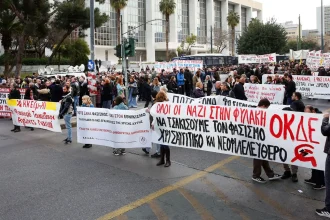President Donald Trump has been cleared in his impeachment trial, ending a congressional bid to oust him from office that bitterly divided the US.
The Senate, run by the president’s fellow Republicans, voted to acquit him 52-48 on charges of abuse of power and by 53-47 on obstruction of Congress.
Democrats charged Mr Trump in December with pressuring Ukraine to smear a potential White House rival.
In November, Mr Trump will be the first impeached president to go for election.
In its historic vote on Wednesday, the Senate decided not to remove Mr Trump from office on charges of abuse of power and obstruction of Congress, arising from his dealings with Ukraine.
The Democratic-led House of Representatives approved the charges on 18 December.
Mr Trump, who is seeking a second four-year term in the 3 November election, denied wrongdoing.
The Trump campaign said in a statement: “President Trump has been totally vindicated and it’s now time to get back to the business of the American people.
“The do-nothing Democrats know they can’t beat him, so they had to impeach him.”
Mitt Romney of Utah was the only Republican senator to vote to convict Mr Trump, on the first charge of abuse of power.
Mr Romney, the 2012 Republican presidential nominee, said earlier on the Senate floor that the president was “guilty of appalling abuse of public trust”.
Despite Democratic hopes, two other moderate Republicans, Susan Collins of Maine and Lisa Murkowski of Alaska did not join Mr Romney in voting to convict the president.
Some Republican senators criticised Mr Trump’s behaviour in recent days but said it did not rise to the level of impeachment.
Three centrist Democratic senators who Republicans had hoped would side with them instead voted to convict Mr Trump.
They were Kyrsten Sinema of Arizona, Joe Manchin of West Virginia and Doug Jones of Alabama.
A two-thirds majority vote was needed to remove Mr Trump, which was always going to be a long shot in a chamber controlled by his party.
America’s 45th president would have had to turn over his office to Vice-President Mike Pence if convicted on either charge.
The impeachment charges focused on Mr Trump’s request that Kyiv announces a corruption investigation into Joe Biden, a Democratic White House candidate, and his son Hunter Biden.
Mr Trump has argued that the younger Biden improperly held a board position with a Ukrainian natural gas firm while his father was US vice-president and in charge of US-Ukrainian relations.
Democrats accused Mr Trump of abusing his power by withholding $391m (£300m) in security aid to prod Ukraine’s president into digging up dirt on the Bidens.
They also charged Mr Trump with obstruction of Congress after the White House blocked testimony and documents sought by the House impeachment investigators.
Mr Trump is the third US president to have been impeached.
The two others, Bill Clinton in 1999 and Andrew Johnson in 1868, were left in power by the Senate and did not seek re-election.















